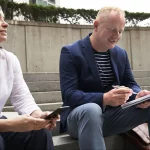What can I do after college?
From applying for a position at a startup to striking out as a freelancer, here are 10 answers to the question, “What did you do right after college that you’d recommend for other college grads to try?”
- Join a Startup
- Travel the World
- Keep Learning
- Work at a Restaurant
- Gain Experience in Your Field of Interest
- Learn a Second Language
- Save Your Money
- Volunteer
- Teach for a Year
- Freelance
Join a Startup
Kick-start your career by working for new startups. Beginner companies give recent graduates the opportunity to gain real-world experience, develop new skills, and understand every detail of establishing a business from the beginning.
This not only helps when someone goes out to build their own business but also provides a chance to work with highly passionate and young individuals in a close environment—which is not very common in big companies.
Personally, working for a startup exposed me to a variety of different roles, such as product development, marketing, and sales. This helped me to understand what areas of business I might be particularly interested in, and to guide my career choices.
Getting a job in a big company as a fresh grad might not have provided room for switching career fields and exploring areas of interest.
Antreas Koutis, Administrative Manager, Financer
Travel the World
I traveled the world. Many people do not tie themselves down to a job, town, or person right after college. With so few obligations keeping a person in one place, why not explore?
Chances are, this kind of freedom won’t be available until retirement. Experiencing other places and cultures can really help shape a person into a more well-rounded individual.
Jae Pak, MD, Jae Pak MD Medical
Keep Learning
Just because you’ve graduated doesn’t mean you’re done learning. As soon as you’ve received that degree, you should already think about what you could learn next.
Often the answer to that would be your first “real” job out of college—learning the ropes, and how to manage the transition from full-time learning to full-time work.
At some point, however, you need to look toward the future, and this point needs to come as soon as possible. So while you’re learning the ropes, start looking for what the surrounding people know and how to best learn that.
Dragos Badea, CEO, Yarooms
Work at a Restaurant
Not only does working at a restaurant straight out of school teach responsibility, but it also provides students with time management skills that they can apply in the real world.
In a restaurant, you serve your customers and ensure the service is the best to your ability. The time management skills come in for waiting on tables in an appropriate time frame. This is an ideal job for those entering the workforce and leaving the nest.
Ann McFerran, CEO, Glamnetic
Gain Experience in Your Field of Interest
When I graduated, I started by working part-time in a field that I’m passionate about, and I recommend others to do the same. Doing so helps gain hands-on experience, build valuable professional skills, and expand your network.
This can give you a better idea of what you want from your career and make it easier to find a full-time job in the future. Pursuing a part-time job you’re passionate about can bring happiness and satisfaction to your life, helping to keep you motivated and engaged.
With the flexible schedule, you can also explore other career options or further your education and training. Overall, working part-time in a field that aligns with your passions can provide a well-rounded and fulfilling experience for college graduates.
Georgi Todorov, Founder, ThriveMyWay
Learn a Second Language
For college graduates, I recommend they take the chance to explore something new while they have the time and freedom.
An example is taking part in a language incubator program. It’s an intense but rewarding experience of learning a second language by completely immersing oneself over a set time.
You will most likely come out with a greater cultural understanding and have real-world practice with your new language skills at the end of it!
Grace He, People and Culture Director, Team Building
Save Your Money
It feels like an odd in-between stage in life—you just graduated from school and are beginning the job search.
Save every penny you can while you can as you get on your feet. If you can, move back home and save your money. When you accept a job, you may need to move and rent an apartment, so it helps to have that stability and savings before the real world begins.
Lindsay Malu Kido, CEO, Empower Pleasure
Volunteer
When I finished college, I spent a gap year volunteering. I joined one of the largest charity initiatives in my country, which helps the financially struggling, abandoned, and disabled create a better future.
It has been one of the most important, eye-opening, and rewarding experiences of my life. Thanks to this precious time, I could reflect on my values, goals, and priorities. Volunteering empowered me and allowed me to grow. I practiced many valuable skills used in the workplace, such as communication, time management, problem-solving, teamwork, and more. I recommend that any college graduates get involved in voluntary work. You won’t regret it, trust me.
Agata Szczepanek, Community Manager, LiveCareer
Teach for a Year
College gives you a false sense of security. In real life, no one cares if you passed your exam. People want to know how reliable, communicative, and competent you are. Teaching helps you build these skills you won’t find in a textbook.I taught 4th graders following college; it was the first time I realized I knew nothing. It was an important realization to make because it drove me to gain mentors, establish community with my fellow teachers, and practice closed-loop communication with my students, parents, and administrators.
Everyone can understand the frameworks used in teaching to break down concepts when we carry them across industries. The hard and soft skills of teaching will serve you no matter what you ultimately decide to pursue.
Elisha Peterson MD MEd FAAP FASA, Anesthesiologist and Pain Medicine Physician, Elisha Peterson MD PLLC
Freelance
After graduating from university, I decided I wanted to work remotely. I didn’t want to be chained to a specific country or city, but I also didn’t want a regular 9-to-5. So, I gave freelancing a go.
Since I was good at writing, I thought I’d try my hand at freelance content writing. I read a ton of guides and resources online on how to break into freelancing, created a portfolio on Google Docs, and set a KPI of 3-4 hours a day for applying to freelancing gigs. And it worked out!
Within a week, I started getting a solid 3-4 qualified leads per month, some of which ended up turning into clients. Freelancing ended up giving me all the experience one needs for starting their own business: doing sales, managing your own time, managing client expectations, and so on. The same skills allowed me to start my marketing agency a few years down the line.
Nick Zviadadze, Founder, MintSEO
Submit Your Answer
Would you like to submit an alternate answer to the question, “What did you do right after college that you’d recommend for other college grads to try?”






